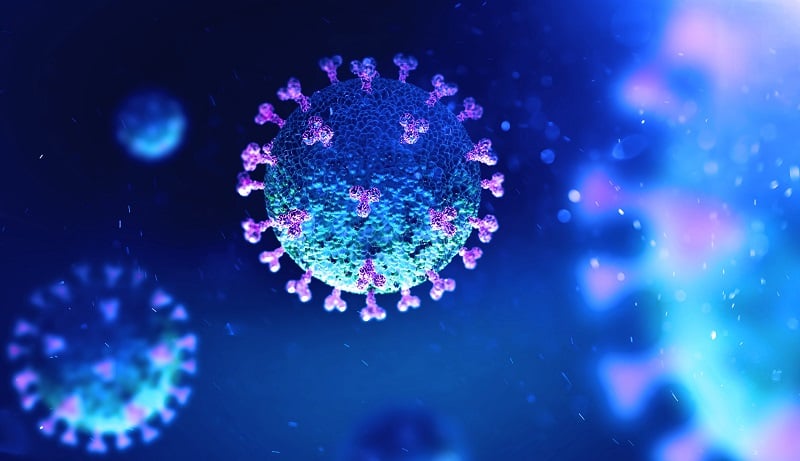Precision medicine tools can accelerate the processes of understanding and treating COVID-19 disease, leading to effective strategies that will help the management of the pandemic.
The selection of the right therapy for the right patient is at the heart of precision medicine and has become a reality for various complex health conditions, such as cancer and cardiovascular diseases. In the context of precision medicine, accurate biomarkers that reflect individuals’ biochemical or genetic characteristics can indicate the appropriate treatment choice, while further drug dosing adjustments can be made thanks to pharmacogenomics.
The application of precision medicine strategies encompasses much more than targeting a specific mutation or modifying the dose of a drug. Precision medicine can accelerate and enhance the accuracy of diagnostic methods, increase positive outcomes of clinical trials and contribute to a well-functioning healthcare system, so, how might such an approach help combat the COVID-19 pandemic?

3 reasons why COVID-19 pandemic requires precision medicine strategies
Infections from severe acute respiratory syndrome coronavirus 2 (SARS-CoV-2) = leading to COVID-19 disease was classified as a pandemic by the WHO in March 2020.[1] SARS-CoV-2 is a previously unknown pathogen that leads to diverse clinical manifestations and, at the start of the pandemic as with a complete absence of selective treatments, the crisis threatened to overwhelm healthcare resources.
The road to precision medicines for COVID-19: individual symptoms vary markedly
SARS-CoV-2 has demonstrated a varied disease profile as not all of the infected individuals experience severe disease. The outcome for an individual is influenced by many factors including age, health status, sex and possibly, as yet poorly understood genetic factors. Infection results in a widely varying outcome, from asymptomatic cases to serious illness and mortality, the clinical profile of COVID-19 indicates that a common therapeutic strategy for all COVID-19 patients may not be feasible. While the absence of symptoms potentially reflects a quick and balanced immune response, massive immune activation can result in a hyper-inflammatory status, known as “cytokine storm”, causing multiple organ failure [1]. Immunosuppressive agents could for example reverse COVID-19 severe outcomes, but moderately ill patients may gain benefit from therapies that stimulate their host immunity [2].
The need for successful clinical trials
Various drugs have been repurposed for COVID-19 therapy and thousands of clinical trials are being conducted worldwide [1]. The top biomarker being used for COVID-19 trials is the positive diagnostic test for SARS-CoV-2 infection, in patients presenting with symptoms relevant to COVID-19 disease [3].
Given the heterogeneous COVID-19 patient population, with different comorbidities and clinical symptoms, conducting trials without more specific biomarkers increases the possibility of drug failure [4]. In a precision-guided trial design, only those patients that are expected to respond to the tested drug - on the basis of their biochemical or genetic profile- are included in later trials phases. This tactic increases the potential of a clinical trial reaching its endpoints and maximizes the therapeutic benefit. This is extremely important in the face of the pandemic, where time and resources are priceless.
Prioritizing “high risk” groups for vaccination
The key strategy for COVID-19 management is the development of a successful vaccine. Providing the vast majority of the population with immunity against SARS-CoV-2, vaccination contrasts the concept of precision medicine, at a first sight. However, once an effective vaccine becomes available, precision medicine strategies could promote a fair and efficient patient selection. Co-existing chronic conditions such hypertension and diabetes, as well as older age in COVID-19 patients have been related to a higher risk of severe illness and mortality [1]. Among the enormous patient population and the limited resources, these and other specific patient characteristics could effectively indicate patient subgroups that are in high need for vaccination.

Using precision medicine tools for COVID-19 pandemic
SARS-CoV-2 genome sequencing
Unlike genetic disorders where patients are treated based on a specific mutation, in viral infections, complex interactions take place between the virus and the host cell. SARS-CoV-2 whole genome sequence and analysis quickly revealed important pathogen-human interactions, paving the way for diagnostic and therapeutic strategies. For example, SARS-CoV-2 uses the viral spike (S) protein to bind to the human ACE2 membrane receptor and achieve cell entry. Numerous studies have investigated whether expression levels of ACE2 differ among patients and are related to increased viral entry and more severe disease outcome in specific patient cohorts [5,6].
Drug screening for SARS-CoV-2 antiviral compounds
At the same time, computational biology makes a huge contribution to the urgent need for therapeutic agents against SARS-CoV-2 infection. Recently, a compound repurposing study identified 100 candidate drugs that are able to inhibit SARS-CoV-2 replication in animal cells [7]. Screening online libraries with thousands of antiviral compounds, drug compounds with the greatest potential to target SARS-CoV-2 lifecycle can be found. Given that most of the molecules identified have been clinically tested for other diseases, their established pharmacokinetic and safety profile will accelerate their preclinical and clinical evaluation for COVID-19 disease. For example, the generic anti-parasitic medication, ivermectin, is currently under evaluation in clinical trials [8].
Genome analysis studies
Genetic analysis of individuals infected by SARS-CoV-2 can reveal potential genetic variations between asymptomatic, moderately ill and those experiencing critical COVID-19 disease. A study of this kind has been conducted by PrecisionLife Ltd, where 976 samples of severe COVID-19 patients have been genetically analyzed, to identify potential genetic signatures related to serious disease progression. Indeed, common patterns were found in critically ill patients, suggesting potential genetic susceptibility, as well as novel therapeutic targets [9]. Such studies need further evidence to establish the potential clinical significance of results.
Biomarkers for the diagnosis or prediction of severe COVID-19
Establishing biomarkers to predict COVID-19 outcome or patients’ response to a drug is one of the most helpful tools of precision medicine. Interleukin-6 (IL-6) has been considered as a candidate biomarker for COVID-19 progression, as elevated serum levels of this cytokine have been related to more severe COVID-19 outcome and pneumonia [9]. IL-6 could thus facilitate severe clinical manifestation assessment upon patients’ hospital admission. Moreover, as IL-6 receptor inhibitors, such as tocilizumab, have been repurposed for COVID-19 therapy, this biochemical feature would also be expected to help patient stratification in clinical trials.
Overall, translating genetic findings into clinical practice and vice versa can be very challenging, especially during a pandemic where knowledge is limited and accurate decisions are essential. Such approaches require not only extensive molecular and clinical research, but also the contribution of computational tools that can drive this research forward. That requires fruitful collaboration between scientists across disciplines. Moreover, ethical issues and time-consuming regulatory processes - usually related to patient data - have to be quickly overcome during such health emergencies. Hopefully, such an interdisciplinary effort will prove the importance of precision medicine in global health emergencies such as the COVID-19 pandemic.
Obtain COVID-19 Related Specimens from our global biorepository →

References
- Shi et al. An overview of COVID-19. Biomed Biotechnol 21:5 (2020)
- Jamilloux et al. Should we stimulate or suppress immune responses in COVID-19? Cytokine and anti-cytokine interventions. Autoimmun Rev 19:7 (2020)
- Global Data Healthcare. Biomarkers being used in trials to propel Covid-19 trials (2020)
- Shrestha et al. Precision medicine for COVID-19: A call for better clinical trials. Crit Care 24:1 (2020)
- Cascella et al. Features, Evaluation and Treatment Coronavirus (COVID-19). StatPearls Publishing (2020)
- Lu et al. Genomic characterisation and epidemiology of 2019 novel coronavirus: implications for virus origins and receptor binding. Lancet (London, England), 395:10224 (2020)
- Riva et al. Discovery of SARS-CoV-2 antiviral drugs through large-scale compound repurposing. Nature 586:1-7 (2020)
- Taylor et al. Analysis of Genetic Host Response Risk Factors in Severe COVID-19 Patients. medRxiv (2020)
- Kaur et al. Ivermectin as a potential drug for treatment of COVID-19: an in-sync review with clinical and computational attributes. Pharmacological Reports (2021)
- Ulhaq et al. Interleukin-6 as a potential biomarker of COVID-19 progression. Med Mal Infect 50:4 (2020)
WHO: World Health organization; ACE2: Angiotensin Converting Enzyme 2




.jpg?width=1000&height=562&name=Untitled%20design%20(10).jpg)



